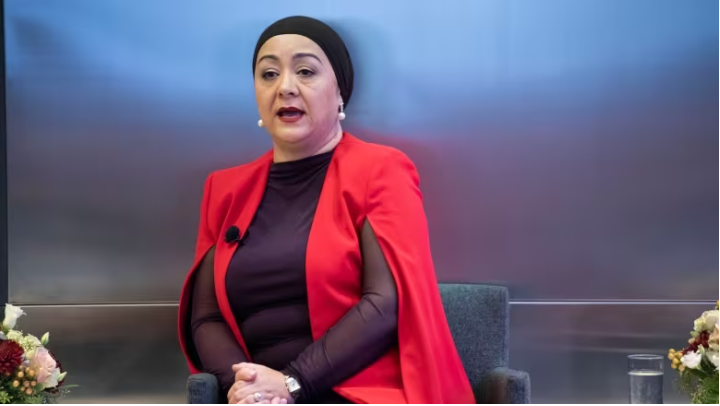Gulchehra Hoja speaks at the 2022 Courage In Journalism Awards, New York at November 01, 2022, in New York City. (Eugene Gologursky/Getty Images for International Women's Media Foundation)
Uyghur journalist chronicles her journey in new book A Stone Is Most Precious Where It Belongs
One night in 2018, 24 members of Gulchehra Hoja's family, including her parents, were arrested by Chinese authorities.
But the Uyghur-American journalist didn't hear about it until two days later, when a friend called with a question: Did she know her parents had been arrested because of her?
"That was the hardest day in my life," Hoja told The Sunday Magazine's Piya Chattopadhyay.
Uyghurs are a majority Muslim ethnic minority primarily based in China's Xinjiang Uyghur Autonomous Region. Hoja and other Uyghurs often refer to the approximate region as East Turkestan.
Human rights organizations estimate that more than one million Uyghurs are being held in Chinese detention camps. The United Nations has reported allegations of torture and abuse taking place in these camps; Chinese authorities have repeatedly denied the allegations, referring to the locations as "vocational education centres."
Hoja fled Xinjiang to the U.S. in 2001, and has been reporting on human rights abuses in China, including of the Uyghurs, for Radio Free Asia.
But before that, she was one of China's most prized propaganda tools, appearing on educational programs for Uyghur children and youth on state television.
She describes the complicated path of her life experiences in her new memoir A Stone Is Most Precious Where It Belongs.
Propaganda tools
Hoja said she was largely unaware of the plight of the Uyghur people when she was a child, as many children are of geopolitical issues.
In the late '90s, while working for local Xinjiang television, she pitched a children's program to teach kids about Uyghur language and history.
"It's really, really important for anybody to know who they are; not only Uyghur, but all the children who would have the opportunity to learn and accept who they are, through [their] identity," she explained.
As a host and entertainer, she was one of the Chinese government's faces of the Uyghur people — even as the population faced persecution then unseen by the wider public.
Slowly, though, things changed. State television's mandate phased out Uyghur lessons, replacing it with Han Chinese content.

"Any media in China is a propaganda tool for the CCP. ... I learned day by day, it's not the journalism I was dreaming for," Hoja said.
While on a trip to Europe in 2001, she heard Radio Free Asia reports for the first time, and also witnessed protests against the Chinese government over human rights abuses against the Uyghurs.
"I was hearing the protesters saying, 'Get out from East Turkestan. Free East Turkestan. Free Uyghurs,'' she recalled.
"I was like, oh my gosh, they can say [those] words? It's unbelievable for me."
Later that year, she fled her home in Xinjiang, and became a reporter for Free Radio Asia herself. She's now based in the U.S.
Brutal conditions in prison
Hoja says her family still living in China were almost immediately threatened by local government officials after she started working abroad. In 2017, Hoja and her father were labelled terrorists.
In 2017, her brother was arrested and detained. The next year, her mother was arrested as well, during a visit to a police station where she thought her son — Hoja's brother — would be released.

Hoja says she learned later that her mother, then 72 years old, was held in a Uyghur detention centre. For the first nine days, she was shackled and given no water and very little food. She was only moved to another part of the detention centre after passing out, requiring medical attention.
Hoja would learn of her mother's arrest — along with those of more than 20 other family members — from that fateful phone call.
She immediately appealed to U.S. officials to pressure the Chinese government for their release.
Her mother was released on March 10, 2018 — 40 days after she was detained. Hoja's brother and other family members would soon follow. But now she says they are under house arrest.
Hoja says she doesn't maintain regular contact with her family out of fear for their safety. They talk on the phone very occasionally, but speak about very little as authorities are likely listening in.

In 2019, the Chinese government released a video of Hoja's parents and brother denouncing her work.
She says it was "heartbreaking" to see the video, and believes they were forced to speak against their wills. But she was happy to see their faces after several years.
"But the feeling of guilt in this was very strong," she said. "They seemed changed a lot. And my mother [looked] much older than what I was expecting."
'We don't have much time'
Hoja wants the world to know the beauty of her people's homeland and culture while also speaking out against their mistreatment.
"I [am] so proud to be Uyghur. I love every aspect about Uyghurs: our clothes, our music, our culture, our food language and our landscape, our weather even," she said.
Earlier this year, Canada's House of Commons unanimously approved a non-binding private member's bill to bring 10,000 Uyghurs and other Muslims of Turkic origin to Canada.

Hoja called this and other initiatives "the biggest hope" for the survival of her people.
"We are just desperately fighting for existence. So anything [that] could help us keep our language, keep our culture alive — please, anything you can do," she said.
"We don't have much time. We don't have much opportunity to save our nation, save our dreams, save our hope."
Interview produced by Sarah-Joyce Battersby.

